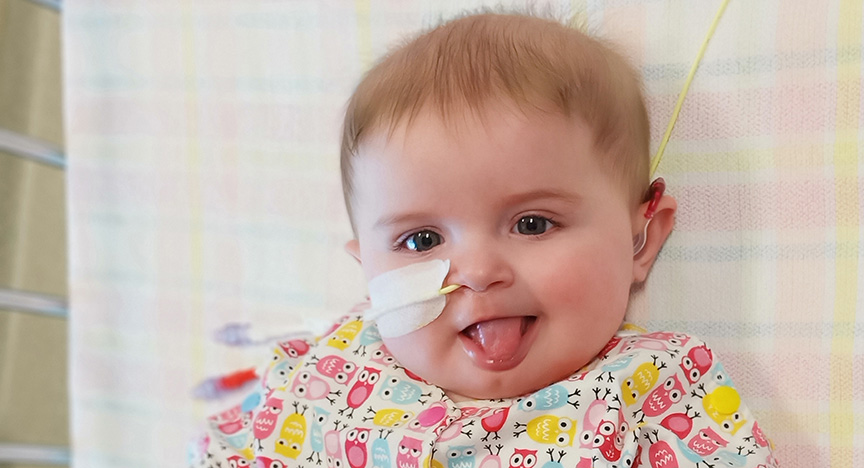
Isabelle thrived in her first three months of life but her great start ended suddenly and dramatically just before Christmas 2020 when she fell ill with a severe lung infection. This led to the discovery of an even more serious underlying cause – the very rare and life-threatening condition Adenosine Deaminase Deficiency Severe Combined Immunodeficiency (ADA-SCID).
SCID is the most serious form of primary immunodeficiency (PID), affecting about one in 60,000 children. ADA-SCID affects only one in a million children, and Isabelle’s case was the first in Queensland in more than 20 years. The condition attacks the immune system leaving it defenceless against infection-producing bacteria, viruses, and fungi. Most infants with SCID are diagnosed within their first 12 months and require a stem cell transplant (or bone marrow transplant) to survive.
Isabelle started showing signs of illness (vomiting, lethargy, quicker breathing) just before her 4-month vaccinations, which luckily were delayed, her mother Louise recalled.
“After nine days of regular GP check-ups where we could not work out what was wrong, Isabelle deteriorated rapidly one morning and we were sent straight to the Emergency Department at the Queensland Children’s Hospital,” Louise said.
“While in Emergency, Isabelle stopped breathing and had to be revived. She was admitted and the immunology specialist was called.
Doctors suspected some form of SCID and ordered further blood tests but before results came back, Isabelle deteriorated further, stopped breathing and had to be placed on breathing support with oxygen. She was transferred to the intensive care unit and placed in a positive pressure room to protect her vulnerable immune system.
Isabelle’s SCID diagnosis was confirmed four days after her admission. Hearing tests also confirmed she had moderately severe permanent hearing loss (most likely caused by the adenosine deaminase toxin spreading in her body).
Isabelle’s specialists were also able to obtain an enzyme replacement therapy, specifically engineered for people with ADA-SCID, from overseas. This therapy improves the immune system function by adding the missing ADA enzyme.
“This was only a bridging treatment, though, which allowed Isabelle to get well enough to be ready for the stem cell transplant needed to treat the ADA-SCID,” Louise said.
The search for a bone marrow donor ruled out Isabelle’s older sister Bridget, and the COVID-19 pandemic also impacted the availability of unrelated donor matches. Fortunately, Isabelle’s father Timothy was able to be a 50% mis-match donor and give her the fighting chance she needed to beat the condition that was crippling her little body.
To the delight of Isabelle’s family, the transplant in March 2021 was a success and 12 days after the procedure her body started producing the all-important white blood cells to protect her from infections. Her white blood cell counts continued to rise and 20 days after the transplant, she was able to go home to spend the remainder of her recovery in an ‘isolation bubble’ with her mum, dad, and big sister.
“In total, Isabelle was in hospital for 94 days, including five weeks in intensive care. She was still only eight months when we took her home but had showed immense internal fortitude when fighting to breathe and fighting off the lung infection. She tolerated the chemotherapy and transplant with minimal side effects and was quite a happy, calm, patient baby through the whole process,” Louise said.
“We’re so proud of her and what she has overcome at such a young age. With the fighting spirit she has shown, we know she is well placed to take on anything that life throws at her.”
For now, Isabelle and her family are hoping her new immune system continues to strengthen so that she can get out and explore the world like any other toddler. Until then she’s working on catching up with all her normal developmental milestones while visiting the hospital regularly for monitoring and stem cell treatments.
“We are so grateful for the medical care Isabelle has received, and the vital plasma and blood transfusions which would not have been possible without donations by thousands of generous strangers.”